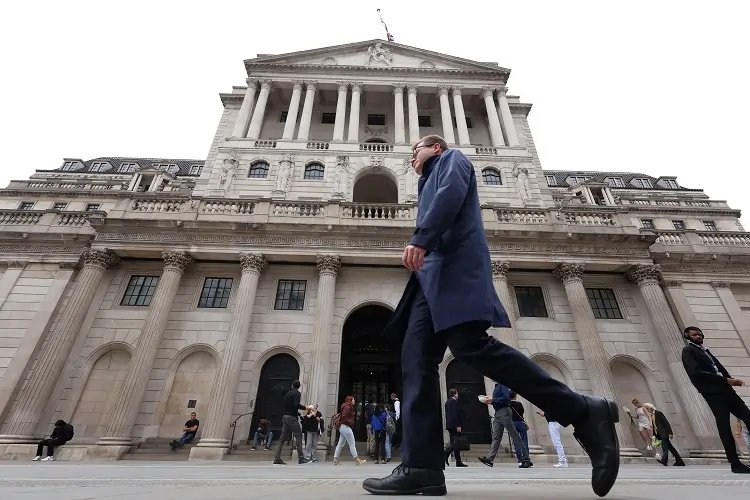Bank of England cuts rates but sees higher inflation after Reeves’s budget


By Andy Bruce, Suban Abdulla, David Milliken
LONDON (Reuters) -The Bank of England cut interest rates on Thursday for only the second time since 2020 and said future reductions were likely to be gradual as it predicted the British government’s first budget would lead to higher inflation and economic growth.
The Monetary Policy Committee voted 8-1 to cut rates to 4.75% from 5%. Analysts polled by Reuters had expected a 7-2 vote. Only Catherine Mann favoured keeping rates on hold.
Sterling rose by two-thirds of a cent against the U.S. dollar but investors kept their expectations for rate cuts in 2025 largely unchanged.
BoE Governor Andrew Bailey said “we can’t cut interest rates too quickly or by too much” but added: “If the economy evolves as we expect it’s likely that interest rates will continue to fall gradually from here.”
Bailey told reporters the BoE might cut rates faster if inflation continued to undershoot the central bank’s forecasts.
The BoE began cutting borrowing costs in August after seeing signs inflation pressures were easing, but stressed it was moving cautiously. In September it kept rates on hold.
Last week’s budget, with its heavy borrowing and spending, prompted investors to dial back their bets on the pace of further rate cuts. Bailey said he did not think that path would be “particularly different” due to the budget.
The BoE said the government’s plans were likely to add almost half a percentage point to inflation at its peak in just over two years’ time and cause it to take a year longer to return sustainably to the central bank’s 2% target.
The budget would also boost the size of Britain’s economy by about 0.75% next year but barely improve annual growth rates in two or three years’ time, the BoE said.
Finance minister Rachel Reeves and Prime Minister Keir Starmer, elected in July, have put stronger growth at the centre of their plans.
Reeves said families would welcome Thursday’s rate cut.
Despite big spending increases in last week’s UK budget, the Bank of England has signalled that it’s not a game changer for future interest rate cuts,” ING economist James Smith said.
“We think the Bank will keep rates on hold in December but accelerate the pace of cuts from February onwards.”
The BoE did not refer in its statement to Donald Trump’s U.S. election victory, which has prompted a big reduction in bets that the Federal Reserve will cut rates aggressively.
Bailey said he would watch for Trump’s trade policies but it was too early to draw conclusions. The president-elect has proposed sweeping import tariffs.
“The upward pressure on inflation from the budget and growing global risks, including possible new U.S. tariffs, could mean that policy is loosened more modestly,” Suren Thiru, economics director at the Institute of Chartered Accountants in England and Wales, said.
Investors think the BoE is likely to cut interest rates more slowly than the European Central Bank. The Fed is expected to reduce rates by a quarter of a percentage point on Thursday.
After the rate decision, financial markets priced between two and three rate cuts from the BoE in 2025, similar to earlier on Thursday and down from around four before the budget.
The BoE said inflation was likely to rise to around 2.5% by the end of 2024 from 1.7% in September and 2.7% by the end of 2025 before falling gradually below its 2% target in mid-2027.
Government decisions to raise a cap on bus fares, hike value-added tax on private school fees and increase employers’ social security contributions were likely to boost inflation.
Together with a 6.7% hike in the national minimum wage, the BoE said employers faced rising costs. But how they will respond remains unclear, Bailey said.
Two of Britain’s biggest businesses, BT and Sainsbury’s, said tax changes in the budget would fuel inflation.
Bailey said the central bank’s key gauge of price pressure – inflation in the services sector – remained too high.
While the BoE cut its forecast for average economic growth this year to 1% from 1.25%, reflecting recent revisions to past growth, it raised its forecast for 2025 to 1.5% from 1%.
“This reflects the stronger, and relatively front-loaded, paths for government consumption and investment more than offsetting the impact on growth of higher taxes,” the BoE said.
While the BoE’s growth and inflation forecasts include the impact of higher spending and taxes, they do not incorporate the effect of a big rise in market borrowing costs since the budget.
If now-higher market interest rates were factored in, the outlook for inflation and growth would likely be a bit lower.
The BoE said it stuck with its existing forecasting convention to smooth out market volatility, and would reconsider market interest rates in December.
(Additional reporting by Catarina Demoney, Muvija M and Alistair Smout; Writing by Andy Bruce and William Schomberg; Editing by Catherine Evans)
Monetary policy refers to the actions taken by a country's central bank to control the money supply and interest rates to achieve macroeconomic goals such as controlling inflation, consumption, growth, and liquidity.
Inflation is the rate at which the general level of prices for goods and services rises, eroding purchasing power. It is typically measured by the Consumer Price Index (CPI) or the Producer Price Index (PPI).
Interest rates are the cost of borrowing money or the return on savings, expressed as a percentage of the amount borrowed or saved. They are influenced by central bank policies and economic conditions.
Economic growth is the increase in the production of goods and services in an economy over a period of time, typically measured by the rise in Gross Domestic Product (GDP).
The Bank of England is the central bank of the United Kingdom, responsible for issuing currency, managing monetary policy, and ensuring financial stability.
Explore more articles in the Banking category











